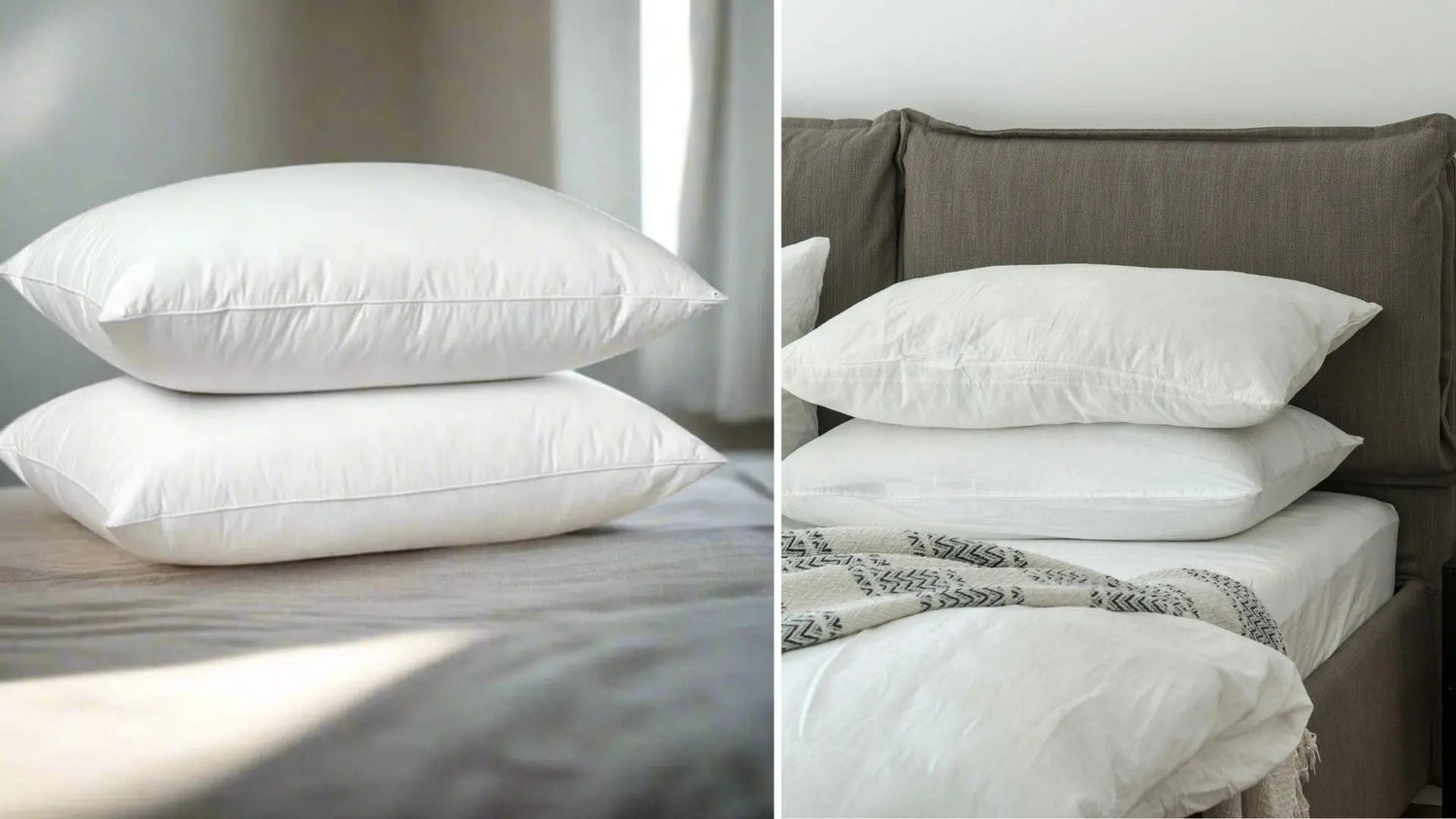When it comes to improving sleep health, many overlook the importance of their pillow.
A good pillow isn't just about comfort—it's an essential part of maintaining proper spinal alignment and ensuring a restful night’s sleep.
Whether you're struggling with neck pain, back pain, or simply seeking better quality sleep, choosing the best pillows for sleep health can make all the difference.
Did you know that your pillow could be contributing to those daily aches and pains?
Choosing the right pillow can alleviate discomfort and improve sleep quality by offering the correct level of support.
But with so many options available, how do you choose the best one? Down pillows or memory foam pillows—which one is better for you?
In this article, we’ll dive deep into the effects of pillow types on your sleep quality and health, comparing down pillows to memory foam pillows, and exploring how different pillows can help with common issues like neck pain, back pain, and spinal alignment.
Whether you're a side sleeper, back sleeper, or someone who suffers from chronic pain, we’ll help you navigate through your options and find the best pillow for your sleep health.
What Makes the Best Pillows for Sleep Health?
Sleep health is essential for overall well-being, and a key factor in maintaining this health is ensuring your body stays in proper alignment during sleep. A good pillow supports your head, neck, and spine, helping you wake up refreshed and without aches or stiffness. But the wrong pillow can cause more harm than good, leading to neck pain, back pain, and disrupted sleep patterns.
How Pillow Types Affect Sleep Health
A pillow that is too soft or too firm can result in improper alignment of your neck and spine, which can lead to discomfort, poor sleep posture, and even long-term issues like chronic neck pain or upper back pain. A good pillow will fill the gap between your neck and the mattress, supporting the natural curve of your spine, which reduces strain on your muscles and joints.
Recommended product: Anti Allergy Functional Fibre Pillow
Neck and Spine Alignment:
When you sleep, whether on your back or side, the pillow helps support the natural curve of your neck and spine. If the pillow is too flat or too high, your spine may not be properly aligned, causing strain on your neck muscles, leading to pain and stiffness. On the other hand, a pillow that supports the neck's natural curve ensures that the spine remains in a neutral position, which reduces the likelihood of neck and back pain.
Pressure Points:
Poor pillow support can lead to pressure points in the neck, back, and shoulders, causing discomfort and disrupting sleep. The best pillow provides even pressure distribution and helps to relieve pressure points that might otherwise lead to tension, discomfort, or pain.
Pillow Types for Sleep Health: What to Consider
- Firmness: A medium-firm pillow provides balanced support without being too stiff or too soft.
- Material: Natural materials like down pillows can be softer but may lack the firm support needed for those with neck and back pain. Memory foam pillows, on the other hand, provide superior support by conforming to the shape of the head and neck.
- Sleeping Position: The ideal pillow varies depending on your sleeping position. For example, side sleepers typically require a higher pillow to keep the neck aligned with the spine, while back sleepers may need a thinner pillow to avoid straining the neck.
Expert Insight
According to Dr. Alan Hirsch, a neurologist and sleep expert, "The best pillow for sleep health is one that provides adequate support for your neck and spine. The right pillow can reduce the likelihood of sleep disturbances and alleviate neck and back pain."
Down vs. Memory Foam Pillows
When it comes to choosing the best pillow for sleep health, down pillows and memory foam pillows are two of the most popular options.
Both offer unique benefits, but selecting the right one depends on your sleep needs, comfort preferences, and any existing pain or health concerns.
Down Pillows
Down pillows are filled with the soft, fluffy undercoating of ducks or geese. They offer a luxurious, soft feel that is highly adjustable.

- Benefits:
- Softness and comfort: Down pillows provide a cushioned, gentle surface for the head and neck.
- Breathability: Natural down allows air to circulate, keeping the pillow cool throughout the night.
- Customizability: The filling can be adjusted to suit your personal comfort level, making it easy to find a soft yet supportive configuration.
- Pros:
- Soft, comfortable, and lightweight.
- Natural material with breathable properties.
- Molds to the shape of your head and neck, making it adaptable to different sleep positions.
- Cons:
- Offers less support compared to memory foam.
- Can lose shape over time, requiring frequent fluffing.
- Not ideal for people with neck pain or back pain, as it doesn't provide consistent support.
Best For:
People who enjoy soft pillows and need an adjustable option for comfort. Ideal for those who sleep on their stomachs or prefer a plush feel.
Here is a detail guide on down and feather pillows.
Memory Foam Pillows
Memory foam pillows are made from viscoelastic foam, which conforms to the shape of the head and neck. These pillows offer superior support and pressure relief.
- Benefits:
- Superior support: Memory foam conforms to the neck and head, providing consistent support throughout the night.
- Pain relief: Helps alleviate neck pain, shoulder pain, and spinal misalignment by evenly distributing weight.
- Long-lasting: Memory foam pillows retain their shape for longer periods compared to down pillows.
- Pros:
- Provides excellent support and pressure relief.
- Conforms to the shape of the head and neck, offering customized comfort.
- Ideal for people suffering from neck or back pain.
- Cons:
- Tends to be firmer, which might not be comfortable for those who prefer a soft pillow.
- Can retain heat, leading to discomfort for hot sleepers.
- Heavier than down pillows, making them less breathable.
Best For:
People with neck pain or back pain, side sleepers, and those who need extra support. Ideal for back sleepers and those who need alignment help.
Read more about the health magic of goose down pillow
Comparison Chart
|
Aspect |
Down Pillows |
Memory Foam Pillows |
|
Material |
Soft, natural down feathers |
High-density foam, synthetic material |
|
Support |
Low to medium support |
High support, pressure relief |
|
Best for |
Comfort and softness |
Neck pain, spinal alignment |
|
Firmness |
Soft, moldable |
Firm, adjusts to shape of head & neck |
|
Durability |
Can flatten over time |
Long-lasting, resistant to flattening |
|
Cooling |
Breathable, natural |
Tends to retain heat |
Pillow Types for Side Sleepers
Side sleepers face unique challenges when it comes to pillow selection. Proper neck support and spinal alignment are crucial for reducing shoulder strain and ensuring a restful night of sleep.
Why Side Sleepers Need Special Pillow Support
When you sleep on your side, there is a significant gap between your neck and the mattress. A pillow that is too thin won’t provide enough support, while a pillow that is too thick will misalign the neck and spine. The ideal pillow for side sleepers should fill the gap without pushing the head up too high.
Best Pillow Types for Side Sleepers
- Medium-firm pillows: These provide just the right amount of height to align the neck with the spine and reduce shoulder strain.
- Contoured pillows: Specifically designed to offer extra neck support for side sleepers. These pillows have a curved design that promotes spinal alignment and reduces pressure on the neck and shoulders.
- Thick pillows: Some side sleepers need thicker pillows to fill the gap between their head and the mattress, ensuring their neck remains aligned with the rest of the spine.
Recommended Pillow Types for Side Sleepers
- Memory foam contour pillows: Offer excellent support and adapt to the shape of your neck, reducing discomfort.
- Down pillows with medium firmness: Provide a softer option for side sleepers who prefer a cushioned feel.
-
Thicker Loft Pillows: Fill the gap between the head and mattress to prevent strain.
Explore more about how you can maintain luxury bedding.
How to Choose a Pillow for Neck Pain

Choosing the right pillow for neck pain is essential for sleep health. A pillow that supports the neck properly can reduce discomfort, alleviate pressure, and help you sleep more soundly.
Pillows for Neck Pain Relief
- Orthopedic pillows and cervical pillows: These are designed to maintain neutral neck alignment by providing extra support for the cervical spine.
- Memory foam pillows: Conform to the natural curve of the neck, offering support and pressure relief.
-
Contoured pillows: Help align the neck and reduce strain by providing additional neck support.
How to Choose the Right Pillow for Neck Pain
- Firmness: Look for a pillow with medium to firm support that holds the neck in a neutral position without pushing it too high.
- Material: Memory foam provides excellent support and conforms to your head and neck. Down pillows are softer but may not offer the necessary support for those with neck pain.
-
Shape: Choose a pillow with a contour or curve that supports the neck’s natural curve.
How a Pillow Can Help with Back Pain
Back pain is one of the most common sleep-related issues, and the right pillow can help alleviate discomfort. A pillow that supports the natural curve of your spine is crucial for maintaining good posture during sleep.
Pillow Support for Back Pain
- Memory foam pillows: Offer firm support and help maintain spinal alignment by conforming to the shape of your head and neck.
- Down pillows: Provide softer support but may not be the best choice for people with chronic back pain due to their lack of firmness.
How to Use Pillows for Back Pain Relief
- Back sleepers: A thin pillow works best, as it doesn’t push the head too high.
- Side sleepers: Place a thicker pillow between the head and mattress to align the neck with the spine.
- Stomach sleepers: Stomach sleepers often benefit from a thin pillow or no pillow at all to avoid strain on the neck.
Additional Tips for Back Pain
Place a pillow under your knees if you are a back sleeper, or under your waist if you are a side sleeper. This can relieve pressure from your lower back and help maintain a neutral spine.
Additional Considerations When Choosing a Pillow
Choosing the best pillow involves considering several factors beyond just material and firmness. Here are a few things to keep in mind:

- Personal Preferences: What feels comfortable to you? The firmness, material, and shape should align with your sleep needs.
- Allergies: If you're allergic to down, consider down alternative pillows or memory foam.
- Temperature Regulation: If you sleep hot, opt for pillows made from breathable materials like cooling memory foam or cotton.
Conclusion
Choosing the best pillow for sleep health is essential for improving neck, back, and overall health. Whether you prefer a down pillow for comfort or a memory foam pillow for firm support, the right pillow will provide the support needed for a good night’s sleep. Remember to consider your sleep position, neck pain, and back pain when selecting your pillow.
Ready to improve your sleep health? Visit our Sobha Hartland showroom and explore our collection of pillow options designed to support your unique sleep needs.
FAQs
What is the best pillow for neck pain?
Memory foam pillows and cervical pillows are the best for neck pain as they provide firm support and align the neck with the spine.
Should I choose a down or memory foam pillow?
Choose memory foam for firm support and alignment, especially for neck and back pain. Down pillows are softer and more comfortable but provide less support.
How do I know which pillow is best for back pain?
For back pain, memory foam pillows are ideal for back sleepers, offering firm support. Side sleepers should use a medium-firm pillow to keep the spine aligned.
Can a pillow improve my sleep quality?
Yes, the right pillow can enhance sleep quality by providing support, reducing pain, and promoting proper spine alignment.
What pillow is best for side sleepers with shoulder pain?
A medium-firm memory foam pillow or contoured pillow is best for side sleepers with shoulder pain, as it supports neck alignment and reduces pressure on the shoulder.






Leave a comment
This site is protected by hCaptcha and the hCaptcha Privacy Policy and Terms of Service apply.